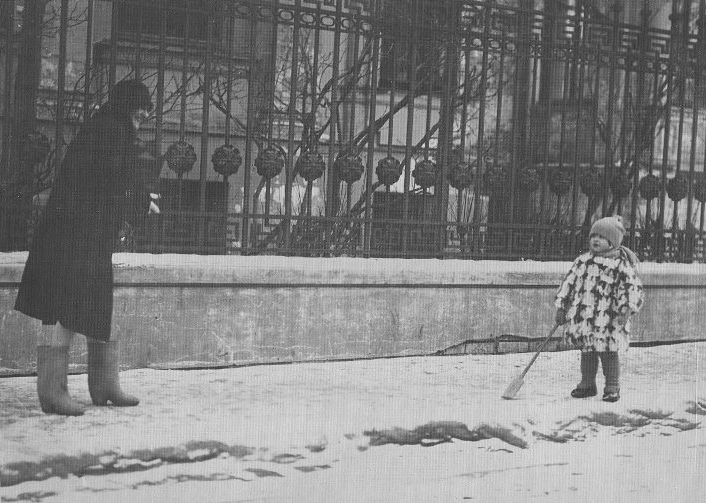№ 66 от 10 декабря
Эд Фалковски
Будет ли она долгой и жестокой, спрашивают себя москвичи? Метеобюро хранит молчание. Будущее — загадка, и за ней последуют личные открытия. Тем временем выпал первый снег. В тихих переулках уже вовсю орудуют пузатые железные «снежные кухни» (снеготаялки. — Moscow News). Их дело — поглотить снег, растворив его. Подкормленные древесиной, разбрасывая искры, они заявляют о себе увесистыми брызгами, требуя любимое блюдо: «Больше снега!». Вагон осилят одним глотком, переварят за минуту. Длинная цепь повозок поджидает своей очереди к кипящей пасти «кухни».
В этой вспомогательной отрасли советской промышленности важны программа, график и техничность. Чтобы справиться с ситуацией, был создан специальный отдел очистки улиц.
Лопата, метла и традиционная лошадь с телегой по-прежнему составляют основу работы, но появление пятидесяти больших снегоочистителей, десяти автоматических снегоуборочных лопат и множества другого оборудования на морозной сцене указывает на то, что рационализация началась.
Организованная атака
Несмотря на то что в распоряжении имеется всего 21 снегоуборочная машина вместо запланированных 139, начальник отдела очистки улиц инженер Никитин считает, что этого будет достаточно, если только в город неожиданно не нагрянут метели.
Обширная городская территория теперь заасфальтирована, это облегчит задачу уборки, по сравнению с другими годами, и автомобильное движение не будет испытывать серьезных затруднений. Между тем санным маршрутам, связывающим окраинные колхозы с городскими рынками, будет уделено особое внимание. Шестьдесят семь улиц и площадей города будут напрямую связаны этими снежными трассами. Приезжающие в город крестьяне смогут ориентироваться по красочным указателям. Триада промежуточных сезонов — время для москвича, чтобы подготовиться к наступающей зиме.
Ранние приготовления
Большинство москвичей начинают готовиться к зиме уже в июне. Те, кто не запасается древесиной загодя, из-за своей беспечной уверенности в завтрашнем дне рискуют заработать насморк и озноб.
В сентябре достают шубы; с самовара, который все лето простоял завернутым в «Правду» в семейном буфете, стряхивают пыль. Чуть позже между рамами окон набивают вату, а щели тщательно замазывают. Отопление начинают тестировать в конце сентября, и по закону все отопительные системы должны быть подготовлены к середине октября.
Старшее поколение старается пореже бывать на морозном воздухе. Они противостоят стихии, прячась дома.
Тем не менее молодые москвичи сбросили с себя оковы страха и превратили Москву в город катков, изобилующих румяными спортсменами; ее холмы расчерчены трассами для смелых лыжников. Город избавляется от психологии «закопаться» и перезимовать. План пятилетки предписывает убирать снег и сохранять движение транспорта в обычном режиме. Это означает, что город должен приспособить зиму к этим требованиям, и, таким образом, знаменует еще один шаг в покорении природы человеком.
Ed Falkowski
Will it be a long and cruel winter? Moscow dwellers ask themselves. The weather bureau maintains silence. The future is to be left to conjecture, to be followed by personal discovery. Meanwhile the first snow is here. And with it the round-bellied iron «snow kitchens» make their seasonal debut in the quieter sidestreets of the city. Their business is to eat up the city’s snow by dissolving it. Fed with hickory logs, and announcing their spark, they call for more presence with much sputter and more of their favorite dish with bottomless appetite."More Snow!" A wagonload is but a mouthful, requiring barely a minute for digestion. A long chain of carts is busy stuffing Moscow’s winter down the «kitchen's» seething maw.
Hence the importance of programs, schedules and technique in this rather subsidiary branch of Soviet industry. A special street cleaning department has been organized to handle the situation. Shovel, broom, and the traditional horse and cart still constitute the basis of this work, but the entrance of 50 large snow ploughs, 10 automatic snow shovels and a formidable array of other equipment on the frozen scene, indicates that rationalization is making a start.
Organized Attack
While the snow cleaning department has but 21 instead of a planned 139 trucks at its disposal for snow removal, the department head, Engineer Nikitin, believes this will suffice unless the city is visited by unusual blizzards.
The extensive city area now under asphalt will ease the task of cleaning as compared with other years and motor traffic will experience slight obstructions. Meanwhile, sleigh routes connecting outlying collective farms with city markets, will receive special attention. Sixty-seven streets and squares of the city will connect directly with these snow-routes. Incoming peasants will be guided safely along the way by colorful signals. The triad of intervening seasons are and the one but short interludes to the Muscovite, between the winter just gone ahead.
«Spring» literally leaps to maturity within ten days; the short summer converts the streets into furnaces from which everybody tries to escape to the dachas; autumn strips the toasted foliage’from the trees again, and the stage is all set for a climatic grand opera of the elements which last from mid-October until April or even early May.
Early Preparations
Most Muscovites purchase their winter in June. He who lets his wood supply wait till snow arrives, is risking chilblains and a running nose for his blithe confidence in «zavtra.»
In September the shuba is dragged out from the mothballs; the samovar, which has stood all summer on the family wardrobe, done space up in a sere «Pravda,» is gotten down and dusted off. A little later cotton wadding is packed into between the double-windows of the houses; the panes are puttied. Official heating tests take place at the end of September, and the law requires all heating lines to be conditioned by mid-October.
The older generation took extreme measures to keep every thought of fresh air outside their rooms. They survived after the fashion of conserves into a jar «canned» to resist the elements.
Young Moscow, however, has sloughed this ancient dread and converted Moscow into a city of skating rinks alive with ruddy athletes; her hills are combed into tracks for daring ski adventurers. The city is losing its psychology of «digging in» and hibernating. The Five-Year Plan rules that snow be removed, and traffic flow as usual. This means that the city must adapt winter to planned requirements, and marks thus another step in man’s conquest of nature.



